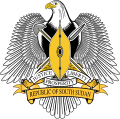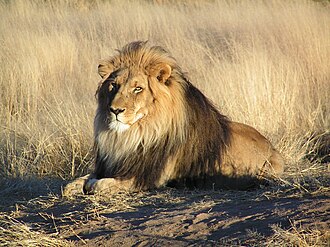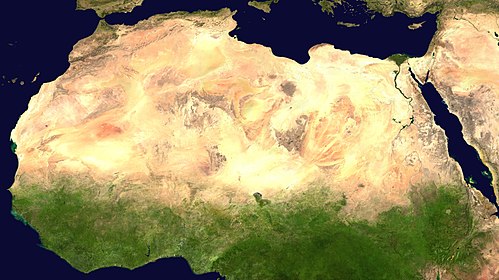Portal:Africa



Africa is the world's second-largest and second-most populous continent after Asia. At about 30.3 million km2 (11.7 million square miles) including adjacent islands, it covers 20% of Earth's land area and 6% of its total surface area. With nearly 1.4 billion people as of 2021, it accounts for about 18% of the world's human population. Africa's population is the youngest among all the continents; the median age in 2012 was 19.7, when the worldwide median age was 30.4. Based on 2024 projections, Africa's population will exceed 3.8 billion people by 2100. Africa is the least wealthy inhabited continent per capita and second-least wealthy by total wealth, ahead of Oceania. Scholars have attributed this to different factors including geography, climate, corruption, colonialism, the Cold War, and neocolonialism. Despite this low concentration of wealth, recent economic expansion and a large and young population make Africa an important economic market in the broader global context, and Africa has a large quantity of natural resources.
Africa is highly biodiverse; it is the continent with the largest number of megafauna species, as it was least affected by the extinction of the Pleistocene megafauna. However, Africa is also heavily affected by a wide range of environmental issues, including desertification, deforestation, water scarcity, and pollution. These entrenched environmental concerns are expected to worsen as climate change impacts Africa. The UN Intergovernmental Panel on Climate Change has identified Africa as the continent most vulnerable to climate change.
The history of Africa is long, complex, and varied, and has often been under-appreciated by the global historical community. In African societies the oral word is revered, and they have generally recorded their history via oral tradition, which has led anthropologists to term them "oral civilisations", contrasted with "literate civilisations" which pride the written word. African culture is rich and diverse both within and between the continent's regions, encompassing art, cuisine, music and dance, religion, and dress.
Africa, particularly Eastern Africa, is widely accepted to be the place of origin of humans and the Hominidae clade, also known as the great apes. The earliest hominids and their ancestors have been dated to around 7 million years ago, and Homo sapiens (modern human) are believed to have originated in Africa 350,000 to 260,000 years ago. In the 4th and 3rd millennia BCE Ancient Egypt, Kerma, Punt, and the Tichitt Tradition emerged in North, East and West Africa, while from 3000 BCE to 500 CE the Bantu expansion swept from modern-day Cameroon through Central, East, and Southern Africa, displacing or absorbing groups such as the Khoisan and Pygmies. Some African empires include Wagadu, Mali, Songhai, Sokoto, Ife, Benin, Asante, the Fatimids, Almoravids, Almohads, Ayyubids, Mamluks, Kongo, Mwene Muji, Luba, Lunda, Kitara, Aksum, Ethiopia, Adal, Ajuran, Kilwa, Sakalava, Imerina, Maravi, Mutapa, Rozvi, Mthwakazi, and Zulu. Despite the predominance of states, many societies were heterarchical and stateless. Slave trades created various diasporas, especially in the Americas. From the late 19th century to early 20th century, driven by the Second Industrial Revolution, most of Africa was rapidly conquered and colonised by European nations, save for Ethiopia and Liberia. European rule had significant impacts on Africa's societies, and colonies were maintained for the purpose of economic exploitation and extraction of natural resources. Most present states emerged from a process of decolonisation following World War II, and established the Organisation of African Unity in 1963, the predecessor to the African Union. The nascent countries decided to keep their colonial borders, with traditional power structures used in governance to varying degrees. (Full article...)
Selected article –
Positive Black Soul (also known as PBS) is a hip hop group based in Dakar, Senegal, one of the first such collectives in the country. Founded in 1989, the group is composed of Didier Sourou Awadi (alias DJ Awadi) and Amadou Barry (alias Doug E. Tee or Duggy-Tee), both of whom had previously been in other hip hop groups. They perform in the English, French, and Wolof languages and use traditional Senegalese instruments as part of their songs. Political and social activism have played important roles in the group since it was founded. (Full article...)
Featured pictures –
Did you know (auto-generated) -

- ... that South African politician Speedy Mashilo was kidnapped for seven hours?
- ... that Malabo Mosque cost about two billion Central African CFA francs to build?
- ... that after the 1999 Tempe military base shooting, the Pan African Congress demanded a military funeral for the perpetrator?
- ... that Malaysian businessman Lim Kok Wing was depicted as "King of Africa"?
- ... that Godwin Obasi has been described as "Africa's gift to the world of climate science"?
- ... that Gil Scott-Heron's 1975 song "Johannesburg" was banned in South Africa during apartheid?
Categories
Selected biography –
Wangarĩ Maathai (/wænˈɡɑːri mɑːˈðaɪ/; 1 April 1940 – 25 September 2011) was a Kenyan social, environmental, and political activist who founded the Green Belt Movement, an environmental non-governmental organization focused on planting trees, environmental conservation, and women's rights. In 2004 she became the first African woman to win the Nobel Peace Prize.
As a beneficiary of the Kennedy Airlift, she studied in the United States, earning a bachelor's degree from Mount St. Scholastica College in Atchison, Kansas and a master's degree from the University of Pittsburgh in Pittsburgh. She then became the first woman in East and Central Africa to become a Doctor of Philosophy, receiving her Ph.D. from the University of Nairobi in Nairobi, Kenya. In 1984, she received the Right Livelihood Award for "converting the Kenyan ecological debate into mass action for reforestation." (Full article...)
Selected country –
 |
 |
|

| ||
South Sudan (/suːˈdɑːn, -ˈdæn/), officially known as the Republic of South Sudan, is a landlocked country in East-Central Africa. It is bordered to the east by Ethiopia, to the north by Sudan, to the west by the Central African Republic, to the southwest by Democratic Republic of the Congo, to the south by Uganda and to the southeast by Kenya.
It gained independence from the Republic of the Sudan in 2011, making it the most recent sovereign state or country with widespread recognition. Its capital and largest city is Juba. It includes the vast swamp region of the Sudd, formed by the White Nile and known locally as the Bahr al Jabal meaning "Mountain River". Sudan was occupied by Egypt under the Muhammad Ali dynasty and was governed as an Anglo-Egyptian condominium until Sudanese independence in 1956. Following the First Sudanese Civil War, the Southern Sudan Autonomous Region was formed in 1972 and lasted until 1983. A second Sudanese civil war soon broke out, ending in 2005 with the Comprehensive Peace Agreement. Later that year, southern autonomy was restored when an Autonomous Government of Southern Sudan was formed. South Sudan became an independent state on 9 July 2011, following 98.83% support for independence in a January 2011 referendum.
Selected city –

Lomé (UK: /ˈloʊmeɪ/ LOH-may, US: /loʊˈmeɪ/ loh-MAY) is the capital and largest city of Togo. It has an urban population of 837,437 while there were 2,188,376 permanent residents in its metropolitan area as of the 2022 census. Located on the Gulf of Guinea at the southwest corner of the country, with its entire western border along the easternmost edge of Ghana's Volta Region, Lomé is the country's administrative and industrial center, which includes an oil refinery. It is also the country's chief port, from where it exports coffee, cocoa, copra, and oil palm kernels.
Its city limits extends to the border with Ghana, located a few hundred meters west of the city center, to the Ghanaian city of Aflao and the South Ketu district where the city is situated, had 160,756 inhabitants in 2010. The cross-border agglomeration of which Lomé is the centre has about 2 million inhabitants as of 2020. (Full article...)
In the news
- 30 April 2025 – Puntland–Somaliland dispute
- Las Anod conflict, Puntland–Somaliland prisoner exchange
- Puntland releases fifteen prisoners of war in exchange for Somaliland releasing eleven combatants captured during the conflict in the contested Sool region. This is the second prisoner exchange of prisoners captured during the conflict in Las Anod. (Hiiraan Online) (Horn Observer)
- 30 April 2025 – Foreign relations of Taiwan, Somaliland–Taiwan relations
- Amid strengthening ties between Taiwan and Somaliland, the Somali government announces a ban on the entry and transit of Taiwanese passport holders through Somalia citing United Nations Resolution 2758 and the One China policy. In response, Taiwan warns its citizens against traveling to Somaliland or Somalia and lodges a protest with the Somali government. (BBC News) (Reuters)
- 29 April 2025 – Boko Haram insurgency
- At least 26 people are killed when a truck hits a roadside bomb in Borno State, Nigeria. (Al Jazeera)
- 28 April 2025 – Red Sea crisis
- The Houthis claim at least 68 people are killed and 47 others are injured in a U.S. airstrike on a prison holding African migrants in Saada Governorate, Yemen. (AP)
- 28 April 2025 – Boko Haram insurgency
- Sixteen people are killed after the explosion of a roadside bomb between the towns of Rann and Gamboru in Borno State, Nigeria. (Al Jazeera)
Updated: 12:05, 1 May 2025
General images -
Africa topics
More did you know –
- ... that Liberia College in the country of Liberia was authorized by the legislature in 1851, but did not start classes until 1863?
- ... that the forced removal of 700,000 people from slums in Zimbabwe in 2005 was called "a crime against humanity" by the UN?
- ... that the supreme god of the southern African Bushmen is Cagn, a trickster who shapeshifts into a praying mantis?
- ... that Bahá'í Faith in Niger began during a period of wide scale growth in the religion across Sub-Saharan Africa near the end of its colonial period?
Related portals
Major Religions in Africa
North Africa
West Africa
Central Africa
East Africa
Southern Africa
Associated Wikimedia
The following Wikimedia Foundation sister projects provide more on this subject:
-
Commons
Free media repository -
Wikibooks
Free textbooks and manuals -
Wikidata
Free knowledge base -
Wikinews
Free-content news -
Wikiquote
Collection of quotations -
Wikisource
Free-content library -
Wikispecies
Directory of species -
Wikiversity
Free learning tools -
Wikivoyage
Free travel guide -
Wiktionary
Dictionary and thesaurus



























































































